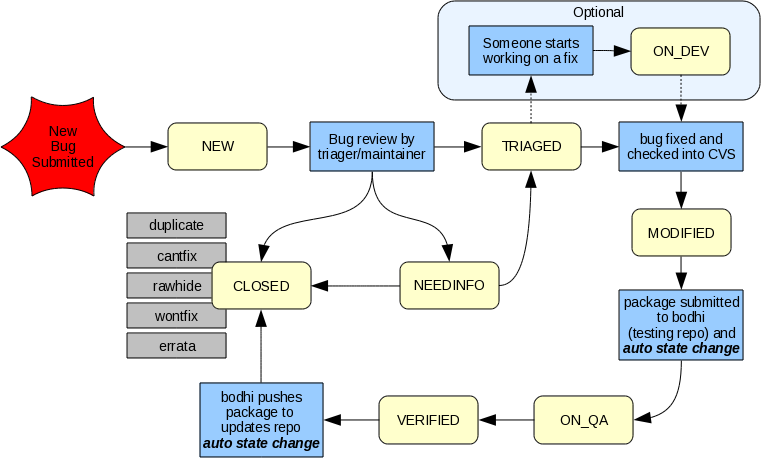| Line 37: | Line 37: | ||
== MODIFIED == | == MODIFIED == | ||
When a maintainer has a fix for a bug checked into CVS the bug should be placed in the MODIFIED state. This is an indication that the fix is checked into CVS and has potentially been submitted to be built in a new package. Adding a link to package in koji is very helpful for adventuresome testers and the original bug reporter to verify the fix. | When a maintainer has a fix for a bug checked into CVS the bug should be placed in the MODIFIED state. This is an indication that the fix is checked into CVS and has potentially been submitted to be built in a new package. Adding a link to package in koji is very helpful for adventuresome testers and the original bug reporter to verify the fix. | ||
<!-- some day we may ask someone that has verified a fix, to change the bug to VERIFIED (they probably can't do this today). Would that be verified that the bug exists or verified that a new release fixes the bug ? | <!-- some day we may ask someone that has verified a fix, to change the bug to VERIFIED (they probably can't do this today). Would that be verified that the bug exists or verified that a new release fixes the bug ? | ||
--> | --> | ||
Revision as of 17:47, 22 October 2008
Fedora Bug Life Cycle
Background
This bug state flow came as a result of the bug triage relaunch that started in January 2008. This work flow was approved at the meeting on January 24, 2008 . As a work flow these are not hard and fast rules to impose on people. Instead it is intended to bring more uniformity and predictability to the life of a bug. If you have a good reason to break them, feel free. This is the process the triage team will follow.
Overview
Source: File:BugZappers BugStatusWorkFlow fedora-bug-lifecycle.odg
ASSIGNED
The triage team believes that this is a complete actionable bug. It contains:
- the correct component
- the correct product
- enough information for the package maintainer to investigate the issue
- enough information to research with upstream or fix the bug
- applicable release blocker or tracker bugs
The reporter has has also included one or more of the following (as applicable):
- clear steps describing how the bug occurred
- clear steps describing how to reproduce the problem
- stack trace for a crasher
- various log files
- AVC message for SELinux
CLOSED
Once a bug has been fixed and included in a new package in rawhide or the updates repo it should be closed. If so designated by the maintainer, Bodhi can automatically close a bug when the package moves from the updates-testing repo to the updates repo.
MODIFIED
When a maintainer has a fix for a bug checked into CVS the bug should be placed in the MODIFIED state. This is an indication that the fix is checked into CVS and has potentially been submitted to be built in a new package. Adding a link to package in koji is very helpful for adventuresome testers and the original bug reporter to verify the fix.
NEEDINFO
Bugs are placed in NEEDINFO by bug triagers when adequate information is missing to move the bug towards resolution. NEEDINFO bugs are eligible for closure (changed to CLOSED) by the triage team after all of the following have been met:
- Bug was original placed in NEEDINFO by a triager or package maintainer
- Requested information requested has not been provided
- Bug has been in NEEDINFO for thirty (30) continuous days.
A stock message will be used by all triagers for bugs meeting this criteria. Stock bug triaging messages are found at: https://fedoraproject.org/wiki/BugZappers/StockBugzillaResponses
NEW
When a reporter files a bug, the report automatically starts out in a NEW state. The triage team will be primarily looking at bugs in this state. From this state, the triage team will change the status to:
- ASSIGNED--the bug is well defined and triaged
- NEEDINFO--additional information is needed from the reporter
- CLOSED--duplicate of an existing bug or another closure reason
ON_QA
- A bug automatically transitions to this state when an updated package is submitted to bodhi for a particular bug and the package is in the testing repo. This tells the bug reporter that a fix for the bug is available and that they should test the package. After testing the package the bug tester or original reporter should put feedback in bodhi and add a comment to the Bugzilla.
- The VERIFIED bug state is not used by Fedora.
POST
- This state is primarily used by developers working on virtualization and the kernel.
- A bug is moved to the POST state (from ASSIGNED) when a patch has been attached to the bugzilla and the gate keeper is wating for the patch to receive three ACKS. Therefore,POST means "a patch is ready, but not yet applied".
- After the patch is applied to the rpm the bug state changes to MODIFIED.

